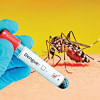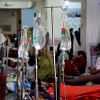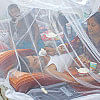Dengue Outbreak: August cases surpass all of 2022

With four days shy of the month-end, August has seen a higher number of dengue cases than all of last year.
According to the Directorate General of Health Services, 2,327 new dengue cases were reported yesterday, taking the month's tally of recorded cases to 62,679.
The number of dengue cases throughout last year was 62,382.
Adding to that, the number of fatalities in August so far – 297 -- also surpassed that of last year's – 281.
Meanwhile, the number of dengue deaths from January till yesterday stands at 548, while the number of patients rose to 1,14,511.
Experts meanwhile reiterate that necessary measures should be taken to kill Aedes mosquitoes and bring the situation under control.
They blame the casual approach of the authorities concerned for the rise in the numbers of cases and deaths this year.
Entomologist GM Saifur Rahman said, "The city corporations' casual approach early in the season contributed to increased breeding of the Aedes population -- carrier of the dengue virus.
"When the Aedes population declined after October last year, no initiative was taken to contain the rest, for which it has started spreading again. Also, we didn't try to detect the virus-spreading mosquitoes at the beginning of this year."
Entomologist Kabirul Bashar, a professor at Jahangirnagar University, said the impact of climate change has also made Bangladesh dengue-prone throughout the year.
As rising numbers of dengue patients strain hospitals across the country, a government survey in Gazipur and Narayanganj has found numerous Aedes breeding grounds.
The DGHS survey found Aedes larvae in 150 houses of the 1,050 surveyed in Gazipur and 95 of the 705 in Narayanganj.
Between July 23 and 28, the researchers visited 41 out of the 57 wards in Gazipur city, and from July 30 to August 3, they visited all 27 wards in Narayanganj city.
Mohammad Khalilur Rahman, former chief entomologist at the DHGS who led the survey, said the density of Aedes in the two cities is high and the continuous rain will create more Aedes breeding grounds.
"Due to a scarcity of running water in both the cities, residents tend to store water in buckets or large pots. These containers often become the ideal breeding places for Aedes mosquitoes.
According to Kabirul Bashar, the measures taken to control Aedes outside the capital have been scanty.
"The government as well as the residents of those cities haven't paid enough attention to controlling Aedes compared to in Dhaka."
Entomologist Saifur said the absence of proper surveillance in district towns has been a major failure this year.
"The government must have effective surveillance to identify dengue hotspots. This will enable local government departments, community organisations and educational institutions to conduct targeted interventions."
He added that city corporation officials and the residents share the responsibility to curb mosquito infestation by creating awareness, cleaning houses, and eliminating potential breeding grounds.
At least 11 more people died from dengue and 2,327 people infected by the disease were hospitalised in 24 hours till 8:00am yesterday.

 For all latest news, follow The Daily Star's Google News channel.
For all latest news, follow The Daily Star's Google News channel. 









Comments